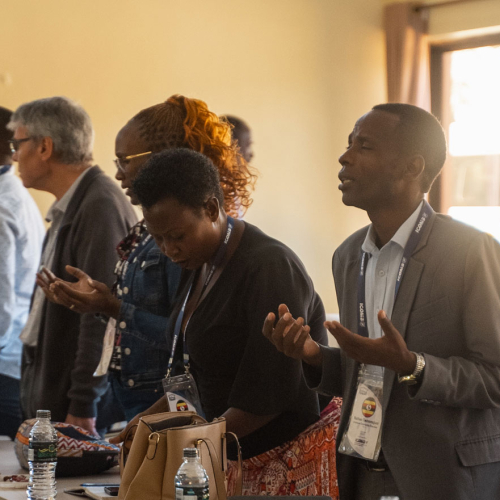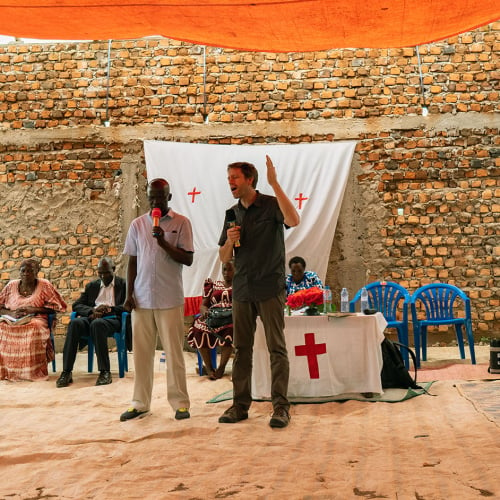When concluding our missionary service in Brazil back in 2007, my wife, Marty, and I reflected on the highlights of our twenty-five-year journey in that country. One of the memories we cherished most was seeing young adults come to faith in Jesus, grow as disciples, and then fall in love with their spouse to be, all in the context of a loving local church. Most of these couples had come from broken homes or dysfunctional families. Their new lives in Christ, new models of marriage, and new guidance from God’s Word were joyfully disrupting the cycle of family brokenness. God was building a new house and home with their lives, and we had hope that their children and grandchildren would continue to experience this abundant life.
Today, we maintain contact via social media with many of these families and, as we consider our investment in discipleship, in pre-marital counseling, and in family friendships, we remember that our labor was not in vain.
Family is a gift not to be taken lightly. The New Testament is filled with family language in reference to fellow believers. John writes, “See what great love the Father has lavished on us, that we should be called children of God! And that is what we are!” (1 John 3:1). He refers to his readers as brothers, children, youth, and fathers. We are the family of God, adopted by the Father, embraced by the Son, and nurtured by the Holy Spirit.
Multiply is now walking with a new family of churches in Uganda called Lifehouse Community Church. Robert and Esther Mponye are shepherding this growing ministry that began twenty years ago when they adopted a newborn child who was literally thrown away. (See page 4 to read the full story, “God Sent Grace.”) As they realized there were many other abandoned children in their town of Mityana, God called them to become family to these children, offering protection, nurture, and instruction. When I stayed in their home, served in their church, and saw scores of healthy children on their school campus, this Scripture took on new meaning for me: “God sets the lonely in families” (Psalm 68:6).
Even though family is complicated at times and takes a tremendous amount of effort to develop and maintain, it is so worth it, and so meant to be shared. I believe God created us to experience his Fatherhood. Until we do, even when we have human fathers and mothers, we are incomplete and, in a sense, homeless. When we went as missionaries to Brazil, we experienced the loss of our home culture, but we could endure it because we knew we were not ultimately homeless. We knew that we had a Father in heaven and we were blessed with a spiritual family, and we were called by our Father to share his blessing with the families that we were to live among.
Genesis 12:3 has been called the Great Commission of the Old Testament: “I will bless those who bless you, and I will curse him who curses you; and in you all the families of the earth shall be blessed.” Abram and Sarai left their home, not knowing their final destination, neither knowing how on earth God would make them, a childless old couple, into a great nation. When Jesus gave the Great Commission, the disciples also did not know where they would go, or how the families of the earth would experience the Father’s blessing of salvation. They only knew the promise of Jesus, “Surely I am with you always.”
How have you experienced the Fatherhood of God? Have you seen God setting the lonely in families? Do you see the Church as the family of God? Would you be willing to leave your home culture like Abram and Sarai in order to share the gift of the Son with the families of the earth?
In my work with church networks, I often hear them yearning for family. In the same way that we as individuals experience the Fatherhood of God through his Son, Jesus Christ, and in the same way that the local church becomes a spiritual family where we find belonging, so too networks of churches desire to be linked with a broader family. As Mennonite Brethren, we have been working at this since the 1870s, knowing that we need each other, and we can accomplish so much more together than alone.
The New Testament is filled with examples of local churches uniting in their common mission and “spurring each other on to love and good deeds” (Hebrews 10:24). The church in Jerusalem offered spiritual assistance to Antioch, who in turn sent famine relief to Jerusalem (Acts 11). When there was a dispute about the inclusion of the Gentiles, church leaders and delegates gathered in Jerusalem to collectively seek God’s guidance (Acts 15). Out of this posture of welcoming, Paul could later write to the Ephesians, “you Gentiles are not foreigners or strangers any longer; you are now citizens together with God’s people and members of the family of God” (2:19, GNT).
A year ago, the International Community of Mennonite Brethren (ICOMB) formally welcomed the MB Church of Malawi (Southeast Africa) as full members of our global family. Just a few years ago, this fledgling network of local churches began in a refugee camp and was looking for broader connections. As a mission agency, we took initial steps to welcome them. Today, they number fifty-four churches and are bearing fruit in various joint ministries for leaders, women, youth, agriculture, and church planting. Now, their leadership is sensing a call to mission beyond Malawi but wants to be sent by the family of churches and form a team with mission workers from other MB families in DR Congo and Angola. As these leaders practice welcoming the stranger, we fully expect much more fruit to come in Africa as a result.
Who is God calling you to welcome into the family? God is on a mission to be Father to the fatherless and to the lonely. Into his family, he adopts orphans, marginalized groups, and disconnected churches. He invites us into his family so that we in turn can become family to those without.
Vic Wiens serves on the Global Lead Team as ICOMB Liaison and is currently acting as the Interim Board-Executive Team Liaison. He and his wife, Marty, spent twenty-five years as missionaries in Brazil.



